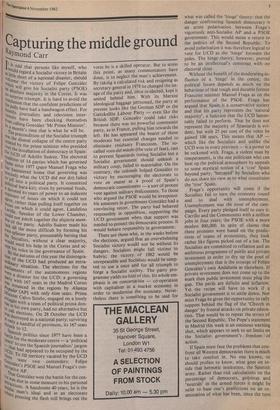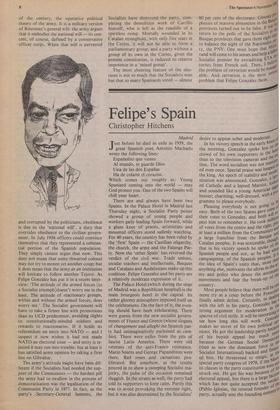1 %Nor i apturing the middle ground
aYmond Carr
It is odd that persons like myself, who would regard a Socialist victory in Britain welcome little short of a national disaster, should eie°rne the victory of Felipe Gonzalez leh will give his Socialist party (PSOE) 1.. abs°Iute majority in the Cortes. It was c° surprise triumph. It is hard to avoid the th°rielusion that the confident predictions of nie Polls have had a bandwagon effect. For v°11ths journalists and television inter- fiewers have been checking themselves jr°111 calling Gonzalez `Mr Prime Minister . /1.,a month's time that is what he will be. was he Precondition of the Socialist triumph heatecras the dismal collapse of the centre party veated by the prime minister who presided the installation of democracy in Spain: c e IJCI) of Adolfo Suarez. The electoral st'alition of 14 parties which has governed 11/321u since 1977 (pace Manuel Fraga who Dr: oe.hanunered h governing was FiselY what theome UCDthat did not do) failed poilteilelilnto a political party. It committed a hara-kiri; riven by personal feuds, iitt devoted its years of power to an indecent Z°sure of issues on which it could not ire, rather than pulling itself together on Ctles On which it could agree. Landelino 4villa c 0 , Speaker of the Lower Chamber, bra not patch together the disjecta mem; tal°f the party. Adolfo Suarez made his 0;`` all the more difficult by forming his the sP1inter party, presumably betting that ws Socialists, without a clear majority, e‘ellid need his help in the Cortes and.ac- 9,t his voice in the governance of Spain. ti 1,IY the autumn of this year the disintegra- :II,. of the UCD had produced an extra- ib;.IlarY situation. The elections for the , uuarnents of the autonomous regions pai.ere disaster for the UCD: a governing u,—,,,t Y with 167 seats in the Madrid Cortes po— trounced in the regions by Alianza hie! tar (AP) with only nine seats. Prime strh"Ister Calvo Sotelo, engaged on a lonely ith,'?gle with a team of political prima don- 1(;"' ul his own party, had no alternative but w Can elections. On 28 October the UCD in as destroyed as a national party; surviving sh°rank to41Y a handful of provinces, its 167 seats
12.
battle Danish politics since 1977 have been a sl;tule r .or the moderate centre — a 'political aee' to use the Spanish journalists' jargon ty,t,hat had appeared to be occupied by the there' To fill territory vacated by the UCD qr,ere were two contenders: Felipe s:uzalez's PSOE and Manuel Fraga's con- 'rvative Ap. trelhat Gonzalez won the battle for the cen- att was due in some measure to his personal me ra.tions. A handsome 40 years, he is the liwhcila rnan's ideal and in an electorate ere Pressing the flesh still brings out the votes he is a skilled operator. But to stress this point, as many commentators have done, is to neglect the man's achievement. By taking a calculated risk and resigning as secretary-general in 1978 he changed the im- age of the party and, once re-elected, kept it united behind him. With its Marxist ideological baggage jettisoned, the party at present looks like the German SDP or the Gaitskellite Labour Party — even like the British SDP. Gonzalez could take risks because there was no powerful communist party, as in France, pulling him towards the left. He has appeared the bearer of those moderate but essential changes needed to eliminate residuary Francoism. The so- called voto del miedo (the vote of fear), cast to prevent Spaniards voting Socialist lest a Socialist government should unleash a military coup, failed to materialise. On the contrary, the colonels helped Gonzalez to victory by encouraging the electorate to vote en masse as a proof of Spain's democratic commitment — a sort of protest vote against military malcontents. To those who argued the PSOE would be irresponsi- ble amateurs in government Gonzalez had a convincing retort. The party had behaved responsibly in opposition, supporting the UCD government when that support was needed to protect the democratic process. It would behave responsibly in government. There are those who, in the weeks before the elections, argued that an overwhelming Socialist victory would not be without its dangers. Socialists might fall victims to hubris; the victory of 1982 would be unrepeatable and Socialists would be temp- ted to use a once and for all triumph to forge a Socialist society. The party pro- gramme yields no hint of this. Its whole em- phasis is on concertacion — co-operation with capitalism in a market economy in order to modernise the economy. Never- theless there is something to be said for
what was called the 'hinge' theory: that the danger confronting Spanish democracy is an acute polarisation between Fraga's vigorously anti-Socialist AP and a PSOE government. This would mean a return to the politics of the Second Republic. To avoid polarisation it was therefore logical to vote for UCD as the 'hinge' between the poles. The hinge theory, however, proved to be an intellectual's construct with no electoral clout.
Without the benefit of the moderating in- fluence of a 'hinge' in the centre, the political future depends as much on the behaviour of that tough and durable former Francoist minister Manuel Fraga as on the performance of the PSOE. Fraga has argued that Spain is a conservative society and that his party represents the 'natural majority', a function that the UCD lamen- tably failed to perform. That he does not represent the majority of Spaniards is evi- dent; but with 25 per cent of the votes he gained 106 seats. This means that AP which like the Socialists and unlike the UCD won in every province — is a power to be reckoned with. Fraga, a violent man by temperament, is the one politician who can heat up the political atmosphere by appeals to some mystical notion of a 'true' Spain beyond party, 'betrayed' by Socialists who do not share his view as to what constitutes the 'true' Spain.
Fraga's opportunity will come if the Socialists fail to turn the economy round and to deal with unemployment. Unemployment was the issue of the cam- paign. Every party pledged itself to cure it: Carrillo and the Communists with a million jobs in four years; the PSOE with a more modest 800,000. In spite of claims that these promises were based on the predic- tions of teams of economists, they look rather like figures picked out of a hat. The Socialists are committed to reflation and an ambitious programme of public and private investment in order to dry up the pool of unemployment that is the scourge of Felipe Gonzalez's own Andalusia as elsewhere. If private investment does not come up to the mark then public investment must plug the gap. The perils are deficits and inflation. Yet the recipe will have to work if a Socialist government is to settle down. Nor must Fraga be given the opportunity to rally support behind the flag of the 'Church in danger' by frontal attacks on private educa- tion. That would be to repeat the errors of the Second Republic. The Pope's statement in Madrid this week is an ominous warning shot, which appears to seek to set limits on the Socialist] government's freedom I of action.
If Spain must face the problems that con- front all Western democracies there is much to take comfort in. No one knows, or should profess to know, what goes on in- side that hermetic institution, the Spanish army. Rather than risk calculations on the percentage of democrats, golpistas and 'neutrals' in the armed forces it might be safer to base one's predictions on an ex- amination of what has been, since the turn
of the century, the operative political theory of the army. It is a military version of Rousseau's general will: the army argues that it embodies the national will — its con- tent, of course, defined by a conservative officer corps. When that will is perverted and corrupted by the politicians, obedience is due to the 'national will', a duty that overrides obedience to the civilian govern- ment. In July 1936 officers could convince themselves that they represented a substan- tial portion of the Spanish population. They simply cannot argue that now. This does not mean that some thwarted colonel may not try to mount yet another coup; but it does mean that the army as an institution will hesitate to follow another Tejero. As Felipe Gonzalez has put it in a recent inter- view: 'The attitude of the armed forces [to a Socialist triumph]doesn't worry me in the least. The attitude of reactionary groups, within and without the armed forces, does worry me.' The Socialist government will have to take a firmer line with promotions than its UCD predecessor, avoiding slights to constitutionally-minded soldiers and rewards to reactionaries. If it holds its referendum on entry into NATO — and I suspect it now wishes it had not made NATO an electoral issue — and entry is re- jected it may run into trouble: but at least it has satisfied army opinion by taking a firm line on Gibraltar.
The army's attitude might have been dif- ferent if the Socialists had needed the sup- port of the Communists — the hardest pill the army had to swallow in the process of democratisation was the legalisation of the Communist Party in 1977. In fact, as the party's Secretary-General laments, the Socialists have destroyed the party, com- pleting the demolition work of Carrillo himself, who is left as the caudal() of a spiritless rump. Mortally wounded in its Catalan stronghold, with only five seats in the Cortes, it will not be able to form a parliamentary group, and a party without a group of its own in the Cortes, given the present constitution, is reduced to relative impotence in a 'mixed group'.
The most cheering feature of the elec- tions is not so much that the Socialists won but that so many Spaniards voted — almost
phesies of massive abstention in the Balite provinces turned out to be false. It Was tit return to the polls of the Socialists In the Basque provinces that gave them eight sel: to balance the eight of the Nationalist P. ty, the PNV. One must hope that Mato will come to his senses and help a fe't,















































 Previous page
Previous page